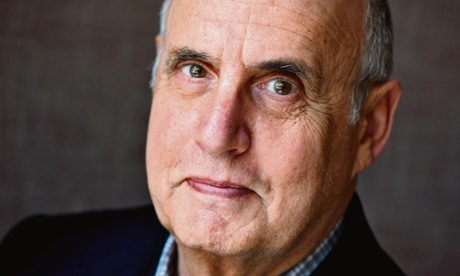The American, high-culture audience will know Cherry Jones as an icon of Broadway, high priestess of off-Broadway, giving definitive performances since the 1980s: famously, Sister Aloysius in Doubt and Amanda Wingfield in The Glass Menagerie, a Tennessee Williams play she describes with such persuasive, feeling admiration that I bought it on the way home (it is really good, by the way).
Dedicated consumers of schlock will be catapulted back to Jones’s President Allison Taylor, from series seven of 24. While the box-set connoisseur will know Jones from Transparent, in which she played Leslie Mackinaw, closely modelled on creator Jill Soloway’s partner, the poet Eileen Myles. Jones says with ridiculous modesty that she usually gets parts at the last minute, when someone else pulls out. “I always like to find out who, so I can send flowers.” But not this part, which was as good as written for her. “No,” she concedes, “Jill wanted a true-blue lesbian. The real McCoy.”
Jones is in London the weekend of the big anti-Brexit march (“I hope to join it later,” she tells me) mainly to support her wife, the film-maker Sophie Huber, who is touring Europe with her documentary, Blue Note Records: Beyond the Notes. “Basically, everyone in it is a black man, so it’s been impossible to get it released in America,” Jones says unflinchingly. With the least confrontational manner, she gets stuck in to politics at every turn, so that you’re constantly spinning between despair at the world, delight that there are souls like hers in it, and blank confusion that the president of the United States just opened the door to you, in a flat next to a bakery in north London.
We’re here to discuss Chimerica, Channel 4’s version of the acclaimed stage play by Lucy Kirkwood, who also wrote this script. It’s pretty traditional four-part drama, about a photographer who scorches his own reputation by doctoring a shot, and tries to redeem himself by tracking down the subject of a photograph he took during the Tiananmen Square protests in 1989.
Jones plays his journalist colleague, classic old-school hack, all fast-talking ribaldry and fierce loyalty. Jones is interested in everything – the future of journalism, the possibility of redemption, what social media has done to our moral compass, the endless accusations that basically sound people level against one another, which “enables the bad guys to succeed because they don’t care about redemption and they don’t get pinned”.
She doesn’t, I have to say, seem terrifically interested in her own performance, apparently missing that gene that brings the conversation back to yourself. “I got cast very late,” she says, “and said yes after 25 pages, because I found it so gripping,” and that’s as far as she’ll go. A trace of stage-snobbery about TV remains, even while the quality and sophistication of shows like Transparent collapse the old distinctions a bit. “I only took 24 because my parents were ill and I needed to get home to Tennessee. And it worked. I was home two weeks of every month for the last three years of their lives.”
Her reservations were about more than whether or not 24 was a bit trashy, though. She talks ruefully of the show’s famous violence: “I guess I mean its violent ethics.” It was so torture-heavy that some seasons – sheesh, season five – seemed to have that as the only question, should this bad guy be mutilated? “Kiefer Sutherland,” Jones remembers mournfully, “had to do a public service announcement for servicemen saying, ‘This was a television show, these are not the ethics of the US government or military.’ Of course, unfortunately, those were the ethics of the US. The fact that [Sutherland] was asked, or volunteered, to make that statement, was deeply troubling to me. But in this case, with ill parents, I fudged. You do. I had to come off my high horse.”
Transparent, meanwhile, plunged the actor into a whole other broiling sea of controversies. The show centres on Jeffrey Tambor’s character, Mort, and the fallout for him and his family when he becomes Maura. When it landed in 2014, that was probably a high point for tolerance all round, and “for a brief moment before Trump, you really felt that everything had changed”.
Yet there simply hadn’t been much representation of transgender people, on TV, and “Jill [Soloway], she would never say this, but she was an angel in helping in such a tremendous way, anyone who wanted a primer on trans people suddenly had Transparent. Then Trump came along, and everything progressive in America was trampled on.” Until the president started trying to ban transgender people from the military in 2017, the issue barely registered as a controversy. “I get the feeling, in the US, that most of the gay community embraces and supports the trans community. Except for the hardest, unyielding segment. I think it might be worse here [in the UK].”
What torpedoed the show was nothing to do with its content, but all about its cast; in 2017, Tambor’s former assistant, Van Barnes, herself transgender, alleged that he’d repeatedly propositioned her, groped her and threatened to sue her. While that was under investigation, Trace Lysette, who plays Shea in Transparent and is one of the first transgender actors to have a speaking role on primetime TV as a non-trans character, came in with similar accusations against Tambor.
Did it poison the project? “I just came from shooting the finale” – a feature-length musical in which Tambor’s character is killed off. “We always used to do this thing called the Box, before we shot every day, it’s like a Quaker meeting house. If the spirit moves you, you can stand on the box. Usually people say what they’re grateful for, not that their husband just left them. Trace and Van spoke about Jeffrey, it was so moving to watch, because when they came out about it, it blew up Jill’s world. Anyway, there was this beautiful back and forth of forgiving, Trace being so gracious about the way Jill handled it, and they all kept saying, ‘Why didn’t we do this before? Why didn’t we circle each other and talk about it?’ And of course they couldn’t. It’s a shameful moment for anyone who’s an artist, you couldn’t do what you knew in your heart was right, because you were paralysed by lawsuits.”
It’s an extremely delicate response: you would wait a long time for Jones to castigate Tambor, partly because castigation is simply not her thing. (Tambor strongly denies any predatory behaviour, and says while he may have been ill-tempered on set the harassment allegations are baseless.) It is also partly because, she says: “I’m at an age where it never even occurred to me that anything would change so significantly. I never even thought gay marriage would happen in my lifetime. The pussy-grabbing audio: pundits went on saying it was sexual assault, and literally, my first thought was, ‘Well it’s not sexual assault.’ I was not defending Trump, I loathed him. But it took me a minute to think, ‘Wait, of course it’s sexual assault’.”
Jones had just finished filming Woody Allen’s film A Rainy Day in New York – “It will probably be his last film ever made in the US, it will never be released in the United States” – when the Harvey Weinstein scandal broke and Allen’s daughter Dylan Farrow wrote her famous op ed, Why Has the #MeToo Revolution Spared Woody Allen? (Allen denies sexually assaulting Dylan as a child.) Jones was asked to comment, and did so reluctantly. “And I did my homework. I went back and studied every scrap of information I could get about that period. And in my heart of hearts, I do not believe he was guilty as charged. I didn’t say that. I just said, in this heated place, there are those who are comfortable with their certainty. I am not. I don’t know the truth, but I know that if we condemn by instinct, democracy is on a slippery slope.”
Her decision to make that statement distils something significant, not just about #MeToo but about modern controversy all over: binary statements – “I believe all women”; “I don’t believe any women” – are quite safe, you have allies and absolutes. To say “I don’t know” is risky and quite lonely, but to heal any schism, some people have to not know. And that is Jones’s absolute preoccupation, how social rifts can be resolved. “With cable news, I don’t know how we ever knit large, democratic societies together again,” she says.
Her aunt Doris in Memphis watches the kind of news network that portrayed the women’s march as a riot. “No ma’am, there were no riots in New York,” Jones remembers saying. “There may be some anarchists in Portland, Oregon.” Trump is bound to be re-elected, “with 42 solid per cent of the voting public supporting him, and the left as divided as we always are. You know, we want to be so proper so we’re always scolding each other.” Her faith in the future of politics is kept alive by the thought that “people talk big and people talk tough, and they may vote for Trump because they think the economy’s better, but it doesn’t mean they hate their gay nephew”, which I guess is something. Mellow, anxious, curious, thoughtful, with this open-hearted civic patriotism, Cherry Jones sounds like nine-parts the highbrow stage artist she has always been; and one part, unshakeably, President Allison Taylor.
Chimerica is on Channel 4 at 9pm on 17 April.











